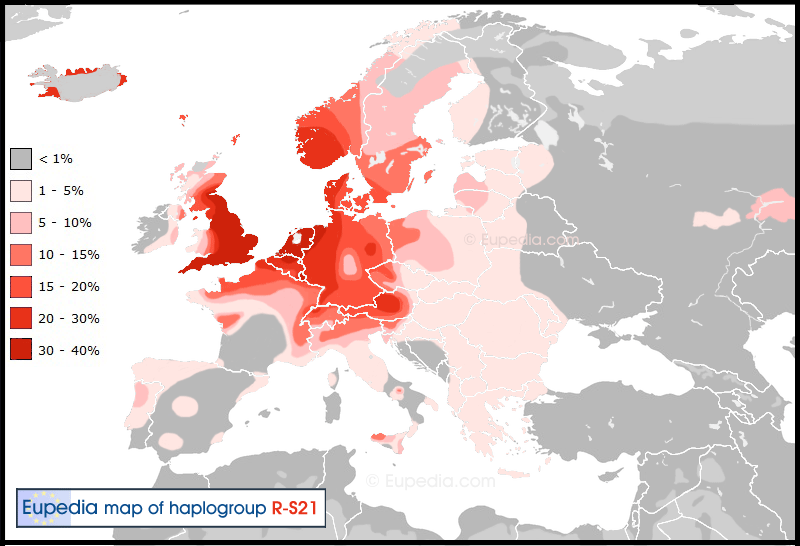7


















| Thumbs Up |
| Received: 2,248 Given: 1,489 |

How Germanic is Great Britain really? Archeologists and geneticists have unveiled surprising revelations about the historical origins of people in the modern United Kingdom -- many of whom have ancestors who once crossed the North Sea.
The fear of a violent conquest of their country is deeply engrained in the English psyche. One of the likely reasons for this fear is that their ancestors committed this misdeed themselves.
According to the Anglo-Saxon Chronicle, two Germanic tribesmen, Hengist and Horsa, came ashore on the coast of Kent in southeast England in the year 449. They had sailed 600 kilometers (372 miles) down the coast from their native North Frisia, and had then made the crossing to a green and pleasant Britain.
The country they encountered was a cultivated place. Emperor Claudius had declared the island a Roman province in 43 A.D., and had introduced theaters and paved streets. There were 30,000 people living in Londinium in late antiquity.
All of this was destroyed, however, when the adventurers -- who became more and more numerous as families were reunited -- arrived from across the sea.
But how many people came to Britain across the North Sea in total? A thousand? Ten thousand? Or was it an even higher number?
Small Caste of Noble Warriors
Until now, the so-called Minimalists have set the tone in British archeology. They believe in what they call an "elite transfer", in which a small caste of Germanic noble warriors, perhaps a few thousand, placed themselves at the top of society in a coup of sorts, and eventually even displaced the Celtic language with their own. Many contemporary Britons, not overly keen on having such a close kinship with the Continent, like this scenario.
Thomas Sheppard, a museum curator, discovered this sentiment almost a century ago. In 1919, officers asked for his assistance after they accidentally discovered the roughly 1,500-year-old grave of an Anglo-Saxon woman while digging trenches in eastern England.
Sheppard concluded that the woman's bleached bones came from "conquerors from Germany" and announced: "These are our ancestors!" But the soldiers were thunderstruck. At first they cursed and refused to believe that they were related to the "Huns." But then the mood darkened. The trip back to the barracks "was like a funeral procession," Sheppard wrote.
Flood of People Crossed the North Sea
But there is no use in denying it. It is now clear that the nation which most dislikes the Germans were once Krauts themselves. A number of studies reinforce the intimacy of the German-English relationship.
Biologists at University College in London studied a segment of the Y chromosome that appears in almost all Danish and northern German men -- and is also surprisingly common in Great Britain. This suggests that a veritable flood of people must have once crossed the North Sea.
New isotope studies conducted in Anglo-Saxon cemeteries produced similar results. When chemists analyzed the tooth enamel and bones of skeletons, they found that about 20 percent of the dead were newcomers who had originated on mainland Europe.
Archeologist Heinrich Härke of the University of Reading has now come up with a quantitative estimate of the migratory movement. He suspects that "up to 200,000 emigrants" crossed the North Sea.
The massive movement of people was apparently triggered in 407 A.D., the year in which the ailing Roman Empire withdrew much of its army from Britain. Soon afterwards, it stopped paying its soldiers altogether. As a result, the last legionaries took off.
This left the island unprotected, an opportunity that the starving people on the continent couldn't pass up. Angles, Saxons and Jutes left their mound dwellings and broad bean fields in the wetlands of northern Europe in droves.
Entire family clans set out to sea, usually in the spring and summer when the water was calm. Their ships were bulging with household goods, cows and horses. According to an old chronicle, the land of the Angles was soon "abandoned."
The new arrivals established their first cemetery around 410 in Dorchester-on-Thames, near Oxford. It was filled with the same kinds of urns, brooches and other ornaments found along the Elbe River in Germany.
Kingdoms Run by Robust Chieftans
Archeologists have now excavated such burial grounds in large numbers. The Germanic farmers of Spong Hill, in eastern England, remained in contact with their old homeland for two to three generations. Härke speculates that a steady stream of adventurers left the mainland between 450 and 550. Nevertheless, there are still inconsistencies. The estimated 200,000 intruders faced an overwhelming number of Britons, about a million, and yet the invaders triumphed. The kingdoms that soon developed, like East Anglia, Wessex (West Saxony) and Essex (East Saxony) were run by robust chieftains like Sigeric and Cynewulf.
The Celts were no match for these roughnecks. The Romans had taught them how to play the lyre and drink copious amounts of wine, but the populace in the regions controlled by the Pax Romana was barred from carrying weapons. As a result, the local peoples, no longer accustomed to the sword, lost one battle after the next and were forced to the edges of the island.
The Old English heroic epic "Beowulf" suggests how coarse and combative life was among the pagan conquerors in their reed-covered huts. They had soon occupied eastern and central England.
The famous legend of King Arthur also originated in that era -- as a form of counter-propaganda. Historians characterize the work as a "defensive myth" created by the original Christian inhabitants (with the Holy Grail possibly symbolizing the communion cup). Perhaps the King Arthur legend is based on a mythical Celtic king who won a victory at Mount Badon around 500 A.D.
'Social Structures Similar to Apartheid'
In truth, however, the army of the Britons was usually in retreat. Many fell into captivity. According to Härke, the captured Britons lived a miserable existence as "servants and maids" in the villages of the Anglo-Saxons.
There were two types of grave in the cemeteries of the time: those containing swords and other weapons, and those with none. The local inhabitants, deprived of their rights, were apparently buried in the latter type of grave.
The London geneticist Mark Thomas is convinced that the conquerors from the continent maintained "social structures similar to apartheid," a view supported by the laws of King Ine of Wessex (around 695). They specify six social levels for the Britons, five of which refer to slaves.
As a result of the brutal subjugation, the reproduction rate of the losing Britons was apparently curbed, while the winners had many children. The consequences are still evident today in the British gene pool. "People from rural England are more closely related to the northern Germans than to their countrymen from Wales or Scotland," Härke explains.
According to Härke, every other man on the island carries the "Friesian gene."
Prodigies appear in the oddest of places















| Thumbs Up |
| Received: 11 Given: 0 |

They should have called it "England is more Germanic than it thinks".
It's good to see the genetic evidence confirming the history. England is Germanic, not British, in the olden days people used to regonise this. In 1642 Jone Hawe wrote:
andThere is no man that understands rightly what an Englishman is , but knows withal, that we are a member of the Teutonic nation, and descended out of Germany (...)
http://books.google.co.uk/books?id=T...hither&f=falseThat whatever blood among us that is not Teutonic is exotic, because as is also before intimidated, our progenitors, that transplanted themselves from Germany hither, did not mix themselvbes with the ancioent inhabitants of the country, the Britons...
Or even older
Anglo Saxon chronicle, year 449
Her Mauricius and Ualentines onfengon rice and ricsodon .vii. winter. and On hiera dagum Hengest and Horsa from Wyrtgeorne geleaþade Bretta kyninge gesohton Bretene on þam staþe þe is genemned Ypwinesfleot, ærest Brettum to fultume, ac hie eft on hie fuhton. Se cing het hi feohtan agien Pihtas, and hi swa dydan and sige hæfdan swa hwar swa hi comon. Hi ða sende to Angle and heton heom sendan mare fultum and heom seggan Brytwalana nahtnesse and ðæs landes cysta. Hy ða sendan heom mare fultum. Þa comon þa menn of þrim mægþum Germanie, of Ealdseaxum, of Anglum, of Iotum. Of Iotum comon Cantware and Wihtware, þæt ys seo mæið ðe nu eardað on Wiht, and ðæt cynn on Westsexum þe man gyt hæt Iutna cyn. Of Ealdseaxon comon Eastsexa and Suðsexa and WestSexan. Of Angle comon, se a siððan stod westi betwyx Iutum and Seaxum, Eastengla, Midelangla, Mearca and ealle Norðhymbra.















| Thumbs Up |
| Received: 11 Given: 0 |

Edit: Double post.















| Thumbs Up |
| Received: 1,296 Given: 3,160 |

This report was based on Weale et al, a study which was widely criticized. Cappeli et al was a better one and surveyed a bigger area. However both are rather old and we know more now, we need a new survey. The genetic testing companies have given us a better picture since.
The English are around 60% Germanic though, I concluded this on another thread.















| Thumbs Up |
| Received: 1,296 Given: 3,160 |

This thread.
And check out two post of mine:
There's your answer - mostly Germanic, somewhere around 50 to 60%














| Thumbs Up |
| Received: 1,150 Given: 11,095 |

Too bad the cars are not as efficient!
Baseball Bat + Orange = Juice


















| Thumbs Up |
| Received: 5,954 Given: 11,022 |

Looking forward to when the POBI release their next paper, and also when they release their Y-DNA, as they collected by region we should also have it presented by region. Also they used many samples from the continent for comparison.
I agree with your 60% Albion, of course it depends on the region but i think if we are going to have a country-wide average it sounds about right, 66% at the higher end of the scale for an average i think though.
Central and Eastern England seem to be the most Germanic areas, and then the north and the south below the Thames. I think it's important as well to look at the map of the island how it was at the time to kind of get an understanding of this, i mean a lot of what is now Cambridgeshire, Lincolnshire etc was sparsely populated fen land due to the high water levels, and of course Anglia was a peninsula - Makes it easier to understand how/why they spread into central England:
Edit: I still think we are best described as a Celto-Germanic nation though, unless you are talking about a few specific areas.















| Thumbs Up |
| Received: 11 Given: 0 |

The news report in the OP wasn't based on Weale et. al, it's based upon research by a M. Thomas who came up with this whole "Frisian gene" thing.
As you said though what the article says is basically true, confirmed by the latest understanding of the Y-chromosomal subclades and the people of the British isles project.


















| Thumbs Up |
| Received: 5,954 Given: 11,022 |















| Thumbs Up |
| Received: 11 Given: 0 |

It can't be U106, as there are no places in the world where that reaches more than 40 percent, while this mysterious Frisian gene reaches more than 100 percent in it's homeland and Eastern England according to Mark Thomas.
U106 is a very strongly Germanic clade though, constituting one of the strongest pieces of evidence for a large Germanic input to the English genepool. The discovery of U106 made the claims of Oppenheimer (that only 5 percent of English men were of Germanic descent!) pretty laughable.

There are currently 1 users browsing this thread. (0 members and 1 guests)
 Canada
Canada
 United States
United States
Bookmarks